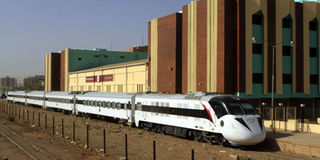All aboard! Sudan’s sleek train a rarity

Sudan's new Nile Train passes through Khartoum, on March 17, 2014. AFP PHOTO/ASHRAF SHAZLY
What you need to know:
- Nation moves to revamp railway system despite economic crisis that has led to high inflation
KHARTOUM, Monday
In a dilapidated, poverty-stricken country where some railway rolling stock is more than 40 years old, Sudan’s sleek, sharp-nosed Nile Train is an unusual sight.
From a distance, it looks like a large white snake gliding past fields of green near the Nile River north of Khartoum.
On January 20, the train began daily passenger service — Sudan’s first in years — as part of efforts to revive the railway system despite an economic crisis that has left the country ravaged by inflation and starving for hard currency.
“This new train is really, really modern,” says Ahmed Hussein, the project manager for Sudan Railways Corporation.
The four coaches roll out of the once-abandoned station in an industrial area of North Khartoum at 9am every day, heading north with two stops before reaching the railway junction town of Atbara.
The journey of close to 300 kilometres takes six hours and 40 minutes. That is roughly twice as long as a bus but a lot quicker than the old trains serving Sudan’s other passenger rail destinations — all two of them.
The train to Nyala, in war-torn Darfur, goes every two weeks, while another makes a weekly trip north of Atbara to Wadi Halfa near the Egyptian border.
Even though track conditions have restricted speeds of the Nile Train, it has proven so popular that in March, the railway doubled its frequency to twice daily in the corridor which is already heavily-travelled by buses, trucks and private cars.
Hussein said every Nile Train service is almost full with an average passenger load of around 284.
Sudan bought two of the trains from China at a total cost of around $13 million, which is being paid over about four years, he said.
Stop using buses
“I think most people travelling between Khartoum and Atbara will stop using buses and change to this new train,” said Hannah Ali Mohammed, 35, marvelling at how, unlike older trains, the air-conditioned coaches kept her clothes free of desert dust during the trip to North Khartoum.
A student, Ahmed Al-Haj Omer, 23, said it was his first time riding the rails.
“I enjoyed it,” he said. “It’s safer. There are a lot of bus accidents on the road between Khartoum and Atbara.”
A bus ticket also costs about 50 per cent more than the 51-pound ($6; Sh516) train trip.
Hassan Abdulmajid, 52, said he has already used the Nile Train four times and hopes other parts of the country will get a similar service.





